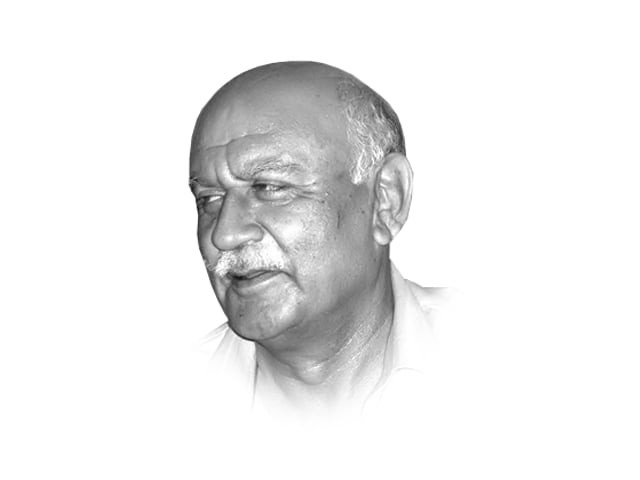Targeting sources of strengths of terrorism
Only all-pervasive corruption can create the hopelessness, which generates hate necessary for commitment to terrorism

The writer is a retired brigadier and a former president of the Islamabad Policy Research Institute
There are two sources from which terrorism draws strength and one that is essential to its success. Each one deserves to be addressed in detail.
The sources of its strength come from: a) its ability to attract fresh recruits to its ranks, nationally and internationally, and b) from the financial support it can muster nationally and internationally. The factor essential to its success is publicity: the media.
But before attempting to address these in detail, it is essential that we understand why. Why are people prepared to commit suicide so that they kill innocent citizens? And why are people — sensible people, donating money and goods to causes they know are supporting terrorism? Not just people even governments are funding them.
But, first why are people supporting terrorism?
In earlier articles, I have referred to the American journalist Sarah Chayes’s book Thieves of State. Using Afghanistan as a case study, she concludes that all these organisations, the IS, Daesh, Al Qaeda, Taliban and, by extension, other terrorists all over the world, are created by, and creatures of corruption. I agree.
In an earlier study by a Muslim-American analyst, she listed five causes for growing religious extremism. I, however, found at that time that these could be grouped under one heading — bad governance.
Having adverted to Chayes’s proposition, I realise how correct she is. Only all-pervasive corruption can create the hopelessness, which generates the kind of hate necessary for the commitment to a cause that thrives on death and destruction.
The other day, we buried Mumtaz Qadri: a terrorist and self-confessed murderer who was so disloyal as to murder the person he was supposed to guard. But, this dastardly murderer had been garlanded in life — not by the illiterate, ignorant “no-bodies” but by lawyers.
Of their own accord, tens of thousands thronged to attend his burial and pay him homage. Liaquat Gardens have not witnessed such an attendance, since the demise of Benazir Bhutto; and her burial had extensive official support.
Are not thousands among that crowd, potential terrorists, and don’t they have ten times the attendance of people who are silent sympathisers who will willingly donate to the cause of terrorism?
Corruption can only thrive if there is injustice. And once corruption is rampant, it cannot but create greater inequality in everything; from monies to goods, services and education. But then, perhaps the root cause is injustice rather than corruption, which thrives on it.
One established fact is that throughout history, mankind has struggled to but one end: egalitarianism for all mankind and all goods and services. It is an unattainable end and therefore, the struggle often sought to reduce inequality.
Politico-economic philosophies also sought the same end, whether in the form of democracy and capitalism or communism and socialism. Both, even as contestants, sought egalitarianism. Today, democracies have become communistic in the concepts of “Local Governments”, and capitalism has acquired socialistic tendencies in its free education, health and other welfare projects.
Denial of equality created revolutions. While no revolution was ever able to create utopia but, even if it initially reduced gaps between haves and have-nots, each soon reverted to elitism and corruption — these two also go hand-in-hand, just as corruption does with injustice.
But this is the cause of all struggles and, I am convinced, the only cause which makes mankind so bestial as to espouse terrorism.
All these extremist groups seek to create another revolution. The only difference is that they lean on religion. While each group touts itself as the only truly Islamic in nature, but they all promise equality on earth and heaven in the hereafter.
That is a lethal mix; a righteous cause coupled with the cleansing power of distorted religious beliefs.
In the eleventh century, Hassan-e Sabbah, belonging to Asasiyun — said to be the origin of the word Assassin (a medieval sub tribe of Nizari Ismailis) took to eliminating political opponents by murdering them. As his reputation grew, so did his clientele and as the story goes, he died a wealthy man, by hiring out political assassins wishing for death.
According to the legend, he created an underground heaven in his castle, where potential murderers were introduced to houris, streams of wine, milk and honey. As a consequence, they sought death willingly to taste the once-savoured heaven forever.
Rumour has it that Daesh has followed that example.
Even if the rumour is false, the IS is certainly making up by permitting its soldiers to rape prisoners or even innocent victims in Syria. And even rape is sanctioned as “Islamic” by their chosen “clerics”.
Before moving further in our study of this subject, it is important to register that injustice (and corruption), breed recruits for terrorists and generate the funding terrorists require.
Published in The Express Tribune, March 25th, 2016.
Like Opinion & Editorial on Facebook, follow @ETOpEd on Twitter to receive all updates on all our daily pieces.













COMMENTS
Comments are moderated and generally will be posted if they are on-topic and not abusive.
For more information, please see our Comments FAQ